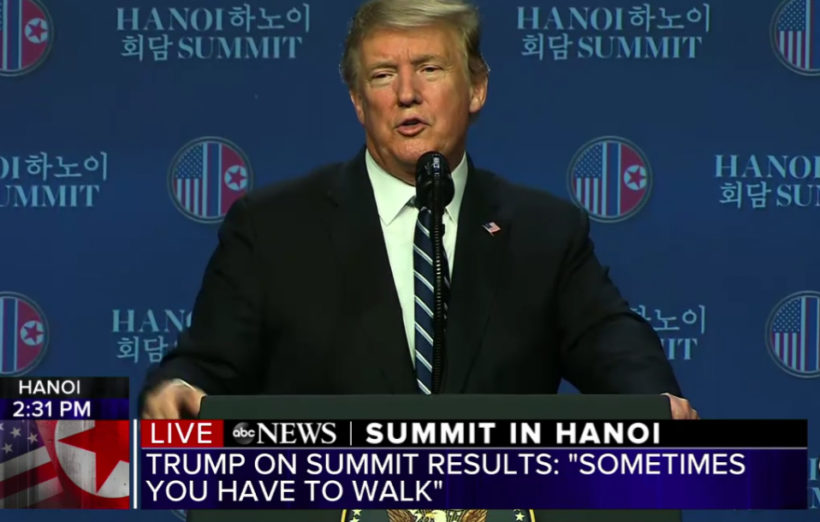
Art of the Deal: Trump Walks Away from North Korean Nuclear Negotiations
redo Jump to...
print Print...
(by Gregg Re, Fox News) — President Trump abruptly walked away from negotiations with North Korean leader Kim Jong Un in Vietnam and headed back to Washington on Thursday afternoon, saying the U.S. is unwilling to meet Kim’s demand of lifting all sanctions* on the rogue regime without first securing its meaningful commitment to denuclearization. [*sanctions are actions that are taken to force a country to obey international laws by limiting or stopping trade with that country, by not allowing economic aid for that country, etc.]
Trump, speaking in Hanoi, Vietnam, told reporters he had asked Kim to do more regarding his intentions to denuclearize, and “he was unprepared to do that.”
“Sometimes you have to walk,” Trump said at a solo press conference following the summit.
Trump specifically said negotiations fell through after the North demanded a full removal of U.S.-led international sanctions in exchange for the shuttering of the North’s Yongbyon nuclear facility. Trump and Secretary of State Mike Pompeo told reporters that the United States wasn’t willing to make a deal without the North committing to giving up its secretive nuclear facilities outside Yongbyon, as well as its missile and warheads program.
“It was about the sanctions,” Trump said. “Basically, they wanted the sanctions lifted in their entirety, and we couldn’t do that. They were willing to denuke a large portion of the areas that we wanted, but we couldn’t give up all of the sanctions for that.”
“I’d much rather do it right than do it fast,” Trump added, echoing his remarks from earlier in the day, when he insisted that “speed” was not important. “We’re in position to do something very special.”
Both leaders motorcades roared away from the downtown Hanoi summit site within minutes of each other after both a lunch and the signing ceremony were scuttled. Trump’s closing news conference was moved up, and he departed for Washington on Air Force One several hours ahead of schedule.
The president said he trusted Kim’s promise that he would not resume nuclear and missile testing, but that the current U.S. sanctions would stay in place.
“No agreement was reached at this time, but their respective teams look forward to meeting in the future,” White House press secretary Sarah Sanders said in a statement prior to Trump’s press conference.
Regardless, Sanders described the meetings between Trump and Kim as “very good and constructive.”
As for a potential third summit, Trump remained noncommittal.
Kim had signaled during an earlier, unprecedented question-and-answer session with reporters [in which he actually answered one reporter’s question] that he is “ready to denuclearize,” reaffirming a commitment long sought by the Trump administration and the international community.
“If I’m not willing to do that, I won’t be here right now,” Kim said through an interpreter.
“That’s a good answer,” Trump replied.
Trump and Kim signed a document during last year’s summit in Singapore agreeing to work toward the “complete denuclearization of the Korean Peninsula,” but tensions have since flared between the two nations, and North Korea later said it would not remove its nuclear weapons unless the U.S. first reduced its own nuclear threat. …
Earlier [on Thursday], history appeared to have been made when Kim answered questions from a foreign journalist — almost certainly for the first time ever.
Asked by a member of the White House press pool about his outlook for Thursday’s summit, Kim said: “It’s too early to say. I won’t make predictions. But I instinctively feel that a good outcome will be produced.” …
Reporters didn’t get opportunities to ask questions of Kim during his three summits with South Korean President Moon Jae-in and his four meetings with Chinese President Xi Jinping. Kim ignored questions shouted at him during his first summit with Trump last June in Singapore.
Trump, speaking next to Kim at the Sofitel Legend Metropole Hanoi hotel, said that “a lot of great ideas” are “being thrown about.” He asserted that “when you have a good relationship, a lot of good things happen.”
“I just want to say: I have great respect for Chairman Kim, and I have great respect for his country,” Trump told reporters as he sat at a table across from Kim in Hanoi. “And I believe it will be something — hard to compete with for other countries. It has such potential.”
Kim, meanwhile, said the “whole world” was watching the talks and suggested that, for some, the image of the two “sitting side by side” must resemble “a fantasy movie.”
President Trump added that while reaching a lasting agreement was critical, “speed is not important.” The two leaders then retired to begin their negotiations privately, but were photographed shortly afterward walking on the Metropole hotel’s pool patio, where they were joined by Secretary of State Mike Pompeo and North Korean official Kim Yong Chol. …
The Associated Press contributed to this report. Reprinted here for educational purposes only. May not be reproduced on other websites without permission from FoxNews.
Questions
1. The first paragraph of a news article should answer the questions who, what, where and when. List the who, what, where and when of this news item. (NOTE: The remainder of a news article provides details on the why and/or how.)
2. Why did President Trump cut short negotiations with North Korean dictator Kim Jong Un? Be specific.
3. What did the president say about coming to a quick agreement with North Korea?
4. a) What are sanctions?
b) What did the president say about U.S. sanctions on North Korea?
c) Ask a parent or grandparent: how important do you think it is for North Korea to get rid of their nuclear weapons and facilities before the U.S. drops sanctions against North Korea? Please explain your answer.
5. Define diplomacy.
6. “Sometimes you have to walk,” Trump said at a solo press conference after ending the summit early.
- Over the past 30 years, through the two terms each of Presidents Bill Clinton, George W. Bush and Barack Obama, the administrations have negotiated with the dictators of North Korea. Every time, the U.S. has given in following Kim’s (and his father and grandfather before him) promises, only to have the promises broken.
- Unlike these past presidents’ type of diplomacy, when Kim continued conducting nuclear missile tests in the beginning of the Trump presidency, he warned him to cease immediately. He called Kim “Little Rocket Man” and warned that continued threats against the U.S. would be “met with fire and fury like the world has never seen.”
- In April 2017, Trump told the United Nations Security Council that the group’s policy toward North Korea needed to change.
He said, ”The status quo in North Korea is also unacceptable, and the council must be prepared to impose additional and stronger sanctions on North Korean nuclear and ballistic missile programs. This is a real threat to the world, whether we want to talk about it or not. North Korea is a big world problem, and it’s a problem we have to finally solve. People have put blindfolds on for decades, and now it’s time to solve the problem.” Since that time, North Korea has not test-fired any more missiles. - As the strict sanctions against North Korea began to be felt by that country, Kim invited Trump to meet last year. Following his tough talk, the president has now taken a more traditional diplomatic stance. While saying he wants to work it out, he also stands firm that he will not remove sanctions until North Korea complies with all requirements.
When the President saw that Kim would not come to an agreement this week, he ended the summit. Watch the video clip under “Resources.” Do you agree with the president’s strategy in dealing with dictator Kim Jong Un? (Does he show strength or weakness, in your opinion?) Explain your answer.
Background
Read President Trump’s Order on Imposing Additional Sanctions with Respect to North Korea issued on Sept. 21, 2017.
From wikipedia — Sanctions on North Korea:
- In September 2017, President Trump issued Executive Order 13810 allowing the U.S. to cut from its financial system or freeze assets of any companies, businesses, organizations, and individuals trading in goods, services, or technology with North Korea.
- Also any aircraft or ship upon entering North Korea is banned for 180 days from entering the United States.
- The same restriction applies to ships which conduct ship-to-ship transfers with North Korean ships.
- Treasury Secretary Steven Mnuchin stated that “Foreign financial institutions are now on notice that going forward they can choose to do business with the United States or North Korea, but not both.”
- A statement from the White House said “Foreign financial institutions must choose between doing business with the United States or facilitating trade with North Korea or its designated supporters.”
- On September 25, 2017, the US Treasury barred the entry of North Korean nationals to the United States.
- Following the abduction of a South Korean fishing vessel, additional sanctions were ordered by the US Treasury on October 26, 2017, following a culmination of “flagrant” rights abuses including executions, torture, and forced labour. Seven individuals and three North Korean entities were affected by the sanctions.
- On July 11, 2018, during a summit in Brussels, NATO leaders [at the urging of the U.S.] called for continued pressure and ongoing sanctions enforcement on North Korea. The group of 29 countries, including the United States, signed a declaration which called on members to maintain pressure on North Korea though also welcomed recent diplomatic progress in the region. (from wikipedia)
The U.S. led the UN Security Council to implement sanctions against North Korea in August 2017 and added more in September. Read the text from the UNSC. September 11 sanctions and August 5, 2017 sanctions
Read previous articles on U.S. and North Korea.
Resources
Watch a BBC video from the first day of the summit, Feb. 27:
Questions and answers on the first day of the summit, Feb. 27:
Watch part of President Trump’s statement Feb. 28 after ending the summit early:
Daily “Answers” emails are provided for Daily News Articles, Tuesday’s World Events and Friday’s News Quiz.



